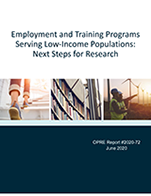Employment and Training Programs Serving Low-Income Populations
Next Steps for Research

 The Office of Planning, Research, and Evaluation (OPRE), within the Administration for Children and Families (ACF), U.S. Department of Health and Human Services, has a long history of supporting rigorous research and evaluation on the broad range of human services programs that fall under ACF’s auspices. Many of ACF’s programs have components aimed at supporting employment among low-income populations, and, consequently, OPRE regularly supports numerous evaluations of employment and training programs for low-income populations, which the office’s Division of Economic Independence oversees. Studies that OPRE sponsored played a key role in the policy debate surrounding welfare reform in the 1990s and since then have contributed to the large, growing body of research that informs policymakers and practitioners in designing and delivering programs to increase work and earnings among low-income families.
The Office of Planning, Research, and Evaluation (OPRE), within the Administration for Children and Families (ACF), U.S. Department of Health and Human Services, has a long history of supporting rigorous research and evaluation on the broad range of human services programs that fall under ACF’s auspices. Many of ACF’s programs have components aimed at supporting employment among low-income populations, and, consequently, OPRE regularly supports numerous evaluations of employment and training programs for low-income populations, which the office’s Division of Economic Independence oversees. Studies that OPRE sponsored played a key role in the policy debate surrounding welfare reform in the 1990s and since then have contributed to the large, growing body of research that informs policymakers and practitioners in designing and delivering programs to increase work and earnings among low-income families.
OPRE funded MEF Associates, in partnership with MDRC, to organize and facilitate a roundtable and prepare a series of white papers to explore future research topics related to employment and training programs for low-income populations. In January 2019, OPRE held a roundtable among policymakers, employers, researchers, and practitioners to discuss the status of and future directions for research on improving the economic prospects of low-income populations. Roundtable discussions focused on specific interventions and research methodology, among other topics. This white paper is the first in a series building on the roundtable discussions.
A. Primary Research Questions
- What have we learned from prior research and evaluation efforts of employment and training programs for low-income populations, and what are the current federally funded research and evaluation efforts?
- What contextual factors and trends will affect the labor market — and, therefore, the employment and earnings prospects of low-income workers — in the future?
- What topics and questions surfaced as salient themes across roundtable discussions?
B. Purpose
This white paper aims to build on the roundtable, summarizing what we know from past and current research, identifying knowledge gaps, and putting forward a set of potential research questions informed by the roundtable discussions that can help define future research opportunities and inform future directions for OPRE’s and other federal agencies’ research and evaluation portfolios and for the broader field of researchers and practitioners.[1]
C. Key Findings and Highlights
Many important questions about designing effective employment and training programs for low-income populations remain unanswered, and recent developments in the labor market and policy trends have posed new questions. This white paper presents several key areas of interest to consider exploring. These topics were identified as gaps in current research and emerged as salient themes across discussions held at the January 2019 roundtable. For each topic, the paper presents potential research questions in the following areas of interest.
- Nature of Work and the Labor Market. Issues related to nonstandard work arrangements, the effect of automation and other technological developments, and the implications of changing labor demand for designing effective employment and training programs.
- Employers’ Perspectives and Roles. Understanding the extent of employer involvement in employment and training programs and research, employers’ roles in supporting the employment of disadvantaged populations, and the effectiveness of current practices and variations in employer practices by employer type.
- Employment Retention and Advancement. Understanding how initial employment affects retention and advancement, exploring the relationship of benefits cliffs to advancement, and identifying approaches to encouraging employment retention and advancement for employed low-income populations.
- Building and Adoption of Evidence-Based Practices. Ways to support the continued expansion of evidence-based practices and the adoption of such practices in programs and human service organizations.
D. Methods
A framing paper prepared for the roundtable by MEF Associates and MDRC reviewed the principal findings from past and current research and served as the starting point for this white paper. Roundtable discussions and insights that grew out of the roundtable shaped the research themes, topics, and questions in this white paper.
E. Suggested Citation
Fishman, Mike, Dan Bloom, and Sam Elkin. 2020. "Employment and Training Programs Serving Low-Income Populations: Next Steps for Research” OPRE Report 2020-72. Washington, D.C.: Office of Planning, Research, and Evaluation, Administration for Children and Families, U.S. Department of Health and Human Services.
[1] The roundtable took place and this paper was drafted before the COVID-19 outbreak that substantially affected the U.S. labor market beginning in early 2020. It does not discuss potential policy developments or future directions for research related to the virus. Future OPRE-funded publications may address these issues.







